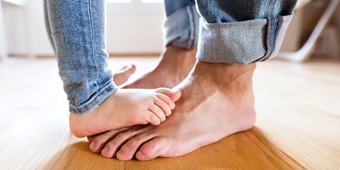Don’t Brush Hair Loss Down the Drain - Treat It!

Find Your Perfect Match
Answer a few questions and we'll provide you with a list of primary care providers that best fit your needs.
Having to clean hair out of your brush every so often is just another part of everyone’s self-care routine.
It’s normal for you to lose up to 100 pieces of hair from your scalp every day – mostly into your brush or down the drain when you shower, according to the National Institutes of Health.
“At the same time that that’s happening though, follicles that have not been growing will enter a stage of regrowth,” says Nurse Practitioner Erin McKibben, of Stillwater Family Care, part of Premier Physician Network. “So, day in and day out, you really shouldn’t notice any changes in the thickness of your hair.”
But if you do start to notice larger amounts of hair falling out than you would typically lose each day, it’s time to talk to your health care provider about next steps.
In addition to clumps of hair falling out, you might also notice:
- Bald patches on your scalp
- Burning scalp skin
- Flaky scalp skin
- Itchy scalp skin
Hair Loss Causes
From medications to genetics, lots of different things can cause you to lose more than a typical amount of hair every day.
“That can range anywhere from hormonal to endocrine problems, such as thyroid disease, polycystic ovarian syndrome, pregnancy and androgenic alopecia, which is just male or female pattern baldness,” McKibben says. “There are a lot of medications that can cause hair loss … Medications that control your cholesterol, blood thinners and then some antidepressants as well. Significant stress can cause hair loss, especially if it’s a sudden shock – emotional or physical.”
Aging is a well-known reason you might start losing your hair. You might also experience hair loss if you wear tight hairstyles too many days in a row or if you have an eating disorder or other condition that causes poor nutrition.
“There are people who are at an increased risk for hair loss,” she said. “Those people would include individuals who have family members that have also suffered from hair loss. People that have comorbid conditions – such as autoimmune disorders or diabetes – they’re also at an increased risk for hair loss.”
Treating Hair Loss
If you have concerns about your hair loss, your health care provider can help you find a treatment option that’s best for you.
“There are medications available to help with hair loss. Over the counter, people commonly will try remedies such as Rogaine,” McKibben said. “Depending on the type of hair loss that you have, your doctor might prescribe a medication.”
Making a lifestyle change might also be the step you need to take to treat hair loss. Those could include:
- Eating a healthy diet
- Exercising
- Getting plenty of sleep
- Making sure you don’t have a nutritional deficiency
- Reducing stress
If it’s possible a medication you’re taking could be causing your hair loss, you doctor might be able to help you find a similar medication that doesn’t have the same side effect.
Click play to watch the video or read video transcript.
Find Your Perfect Match
Answer a few questions and we'll provide you with a list of primary care providers that best fit your needs.
Source: Erin McKibben APRN, FNC-P; Stillwater Family Care; National Institutes of Health






